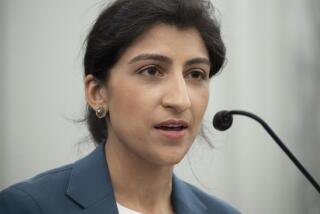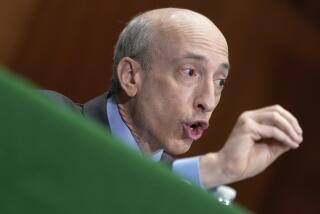SEC Sends Questions on Trading to Funds
- Share via
The Securities and Exchange Commission has sent questionnaires to about three-quarters of all U.S. mutual fund companies in its probe of hedge fund after-hours trading practices, SEC Chairman William Donaldson said Sunday.
He also announced the creation of a joint federal-state working group to find ways to coordinate enforcement probes.
The SEC is “asking a lot of questions about incentives for sales” and “the recent issue of time lags in buying and so forth,” Donaldson said before speaking at a North American Securities Administrators Assn. conference in Chicago. “We’ll be coming up with recommendations in those areas.”
The SEC has intensified its investigation of the industry since Sept. 3, when New York Atty. Gen. Eliot Spitzer announced a $40-million settlement with hedge fund Canary Capital Partners and its managing principal Edward Stern over allegations that the fund engaged in illegal trading of shares of mutual funds at Strong Capital Management Inc., Bank of America Corp., Janus Capital Group Inc. and Bank One Corp.
Donaldson said his staff also had spoken with the top executives at the four firms. He said he could not estimate how long the SEC’s review would take.
SEC enforcement chief Stephen Cutler said the majority of the firms “are taking it seriously” and have been cooperating.
“Significant document and information requests have been made,” Cutler said after taking part in a panel discussion at the securities conference.
He said the SEC is coordinating its efforts with Spitzer’s office.
BofA and the other firms allowed Canary to engage in late trading and so-called market timing practices, Spitzer alleged. U.S. mutual fund shares are valued daily at 4 p.m. New York time. Investors who trade after the deadline can take advantage of market-moving information as much as 24 hours before the shares are valued again. Federal and state laws bar the practice.
In his comments to the securities association, Donaldson on Sunday pledged cooperation with state regulators, saying they share a common aim.
His comments come in the wake of accusations by state regulators -- including Spitzer and Massachusetts Secretary of the Commonwealth William F. Galvin -- that the SEC is slow to protect investors.
“I wouldn’t be surprised if some investors, watching the reported tussle, have been wondering: ‘If state and federal regulators are fighting amongst themselves, who is looking out for me?’ ” Donaldson told the association. “Everyone in this room is committed to rooting out fraud and corruption in our markets and otherwise protecting investors.”
The joint initiative -- announced at the Sunday conference by Donaldson and Christine Bruenn, president of the association -- is meant to improve cooperation between state and federal regulators.
The action follows a feud Donaldson has had with Galvin and Spitzer over a bill in Congress that would limit the power of state regulators and reaffirm the SEC’s role as the nation’s primary securities regulator. The key, Donaldson said, is striking the right balance between state and federal authority.
“I’m reminded of all those cop shows where the local police force and the FBI tussle over who’s going to work a high-profile crime case,” he said. “Just as the FBI and the local police want to solve the crime and do justice, so do federal and state securities regulators.”
Donaldson also said Oklahoma’s decision to charge WorldCom Inc. and several of its former executives with securities fraud might jeopardize federal efforts against the company.
“The failure of the Oklahoma attorney general to inform federal officials, who had been actively investigating the WorldCom fraud, runs the risk of undermining the federal prosecutions, raising the possibility that those most deserving of prosecution could slip through the net,” he said.
More to Read
Inside the business of entertainment
The Wide Shot brings you news, analysis and insights on everything from streaming wars to production — and what it all means for the future.
You may occasionally receive promotional content from the Los Angeles Times.










